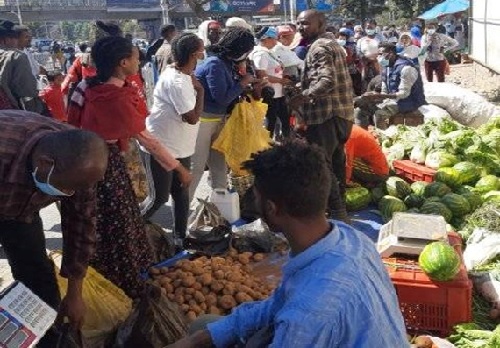
BY HIZKEL HAILU
Different researches of scholars indicate that Cooperatives in the world, particularly in Ethiopia are playing a vigorous role in the fields of banking, input and output marketing, agro processing, storage, dairy, and many other social and economic activities. Additionally, Cooperatives have inherent advantages in tackling the problems of poverty alleviation, food security and job creation.
They are also considered to have colossal potential to deliver goods and services in areas where both the public and the private sectors have failed to address. Serious efforts are being made to strengthen capital base of cooperatives through increasing members’ subscription, mobilization of savings and value addition. The establishment of agricultural cooperatives, for instance, in Ethiopia is significantly associated with and responsible to overcome the problems that individual farmers could not solve solely.
The cooperatives were thus permitted to exchange their members’ product, improve market access and directly provide their produce to the market through improving the bargaining power of farmer members. Ethiopian Government has also made efforts for cooperatives development that can be taken as opportunities. On top of that, at a time where the world is celebrating 100th International Day of Cooperatives, Ethiopia also announced that the country is working hard to strengthen the active role of cooperatives for the nation’s economic growth.
Both international and local experiences indicate that cooperatives are seemingly important to create vibrant economy if the government and all stakeholders of the field can work smoothly and in unison, Ethiopian Cooperative Commission (COOP) announced.
Celebrating the 14th National Day of Cooperatives last week under the theme “Cooperatives build a better Ethiopia”, COOP’s Deputy Commissioner Abdi Mumed stated that the theme is underpinning how agricultural cooperatives are at the forefront to tackle the economic challenges that the country is facing in times of the current war economy.
He also pointed out that the aim of celebrating Coops Day is to increase awareness of cooperatives and promote the movement’s ideas of international solidarity, economic efficiency, equality and world peace. According to him, agricultural cooperatives are highly significant to combating food insecurity, price hikes and inflations among the most severe challenges facing the country. He also mentioned that policy makers should consult the sector when developing and promoting food security policies while he was noting that cooperatives should be seen as valuable interventions in the nation’s effort to build more sustainable food system.
Cooperatives in Ethiopia play fundamental role in improving the functioning of national food system. They were created to empower producers and consumers as well as to shorten supply chains by eliminating unnecessary intermediaries. Coupled with providing essential products, such as basic and quality wheat seeds to the community, cooperatives have also allowed women to secure a steady income for themselves and their families and plan more ambitious projects.
He also accentuated that the commission is highly engaged in drafting new strategies to strengthen the national economic contribution of the cooperatives. Accordingly; applying contract farming principle, allowing the government to set prices on major commodities and value additions are among others which they are planning to work thoroughly.
The commissioner on the behalf of the commission and the cooperative unions asked government to strengthen domestic food production infrastructure and food supply chains by working together with cooperatives and other stakeholders.
While presenting his paper entitled with “cooperatives resist crises period”, Diriba Bekele explained that cooperatives have abundant use for national economy, poverty reduction, job creation, peace building, climate change mitigation and gender equality. He further mentioned that producers shall modernize their mechanisms for better achievements.
Moreover, he pointed out that the experience on the successful achievement in wheat production and productivity shall be expanded to other products that will be vital for both local consumption and export market. On top of that, the cooperatives along with the government and other stakeholders shall play their significant role in increasing the productivity.
“Even if the country was or is under a big challenges like; COVID-19, drought, locust invention, internal conflict, and Russia-Ukraine war among others, the cooperatives are playing their significant role in supporting the society and the nation’s economy as well through different circumstances. Sunday market, exhibition and bazaars coupled with creating strong market chain among the suppliers and consumers are among the activities done by the Commission”’ he noted.
On their action research Abebaw Yenesew and Dejen Debeb, Lecturers in the Department of Accounting and Finance at Debretabor University stated that like other developing countries, the cooperative sector of Ethiopia also faces many challenges. An Organizational and Structural challenge is one of the major challenges of the sector. According to the study, many cooperatives in Ethiopia are agricultural cooperatives with limited means. Unfortunately, government has very limited personnel and other resources to conduct awareness creation activities.
As to the researchers, resources and capacity challenge is also a big problem of cooperatives. Generally, the cooperatives face a financial problem that hinders expansion activities of their business and hire professionals to become more effective in their operations. Apart from the aforementioned challenges, their finding also pointed out that the field has monitoring and evaluation as well as political legal challenges.
The concept of the people to accept cooperatives as an economic alternative was affected due to the political interference in the affairs of cooperatives and delay in settlement of disputes. The cooperative proclamation gives clear direction and guidelines to run a cooperative as an autonomous association. But it has not reached to the people fully yet.
According to the study, advanced cooperative certification system classifies and certifies cooperatives based on a comprehensive set of criteria. Public certification allows third parties to identify and work with capable cooperatives by providing a clear indication of their performance in several areas. Simultaneously, it provides the opportunity to flag underperforming cooperatives for capacity building and training initiatives. The Federal Cooperatives Corporation has developed a framework of certification directives and criteria, as well as designing and setting up a structure for certifying bodies at federal and regional levels.
As much as possible, inviting cooperative professionals to lead the sector coupled with Conducting Training to office bearers and education to the members pertaining to their specific needs and among others is recommended as a solution to transform the sector. As to their recommendation, cooperative management, though applies all modern management techniques, has its own special features.
Cooperatives have to first follow the principles of cooperation laid down by International Cooperative Alliance, and then they have to go for applying the management process. It has to keep a balance between these two. The proper application of cooperative principle is necessary for the success of the movement, for cooperative principles is those which are essential that is absolutely indispensable to the achievement of cooperatives movements’ role. In this regard, professionals working must be those who know the special features of cooperative business.
Moreover, the fifth Principle of the cooperatives stated that cooperatives must provide education and training for their members, elected representatives, managers and employees. So they can contribute effectively to the development of their cooperatives. But in most of the agricultural cooperatives in the study area, members and elected representatives are getting training and education seldom. This situation has significant impact on the growth of their cooperatives. Therefore, the concerned bodies have to provide the training to office bearers and education to the members.
As to Diriba Bekele, currently, there are about 100 thousand cooperative unions in Ethiopia with a total capital of 24 billion Birr and with 25.4 billion Birr saving increment. Also being visionary and futuristic, increasing internal capacity as well as adopting crisis management strategy are among the focusing point of the Commission, he underscored.
And these cooperatives are playing significant role in booming the nation’s economy, officials stated. Through understanding cooperatives’ indispensable role in addressing structural problems Ethiopia is facing nowadays, they are believed to play a prominent role in achieving goals of the broad development policy and strategy of the country, so that the government and all the stakeholders should work in unison, officials and researchers underscored.
The Ethiopian Herald June 24/2022





